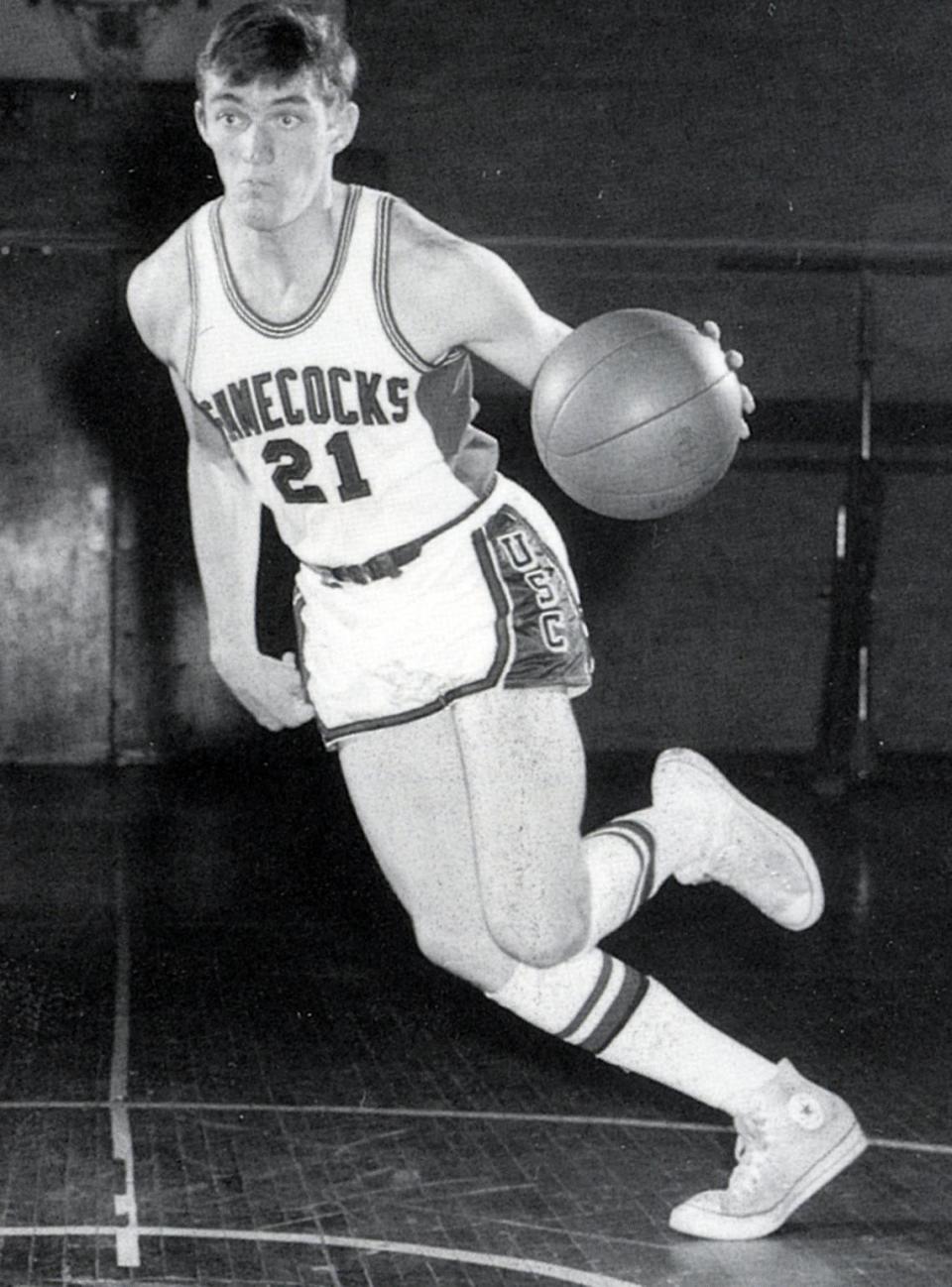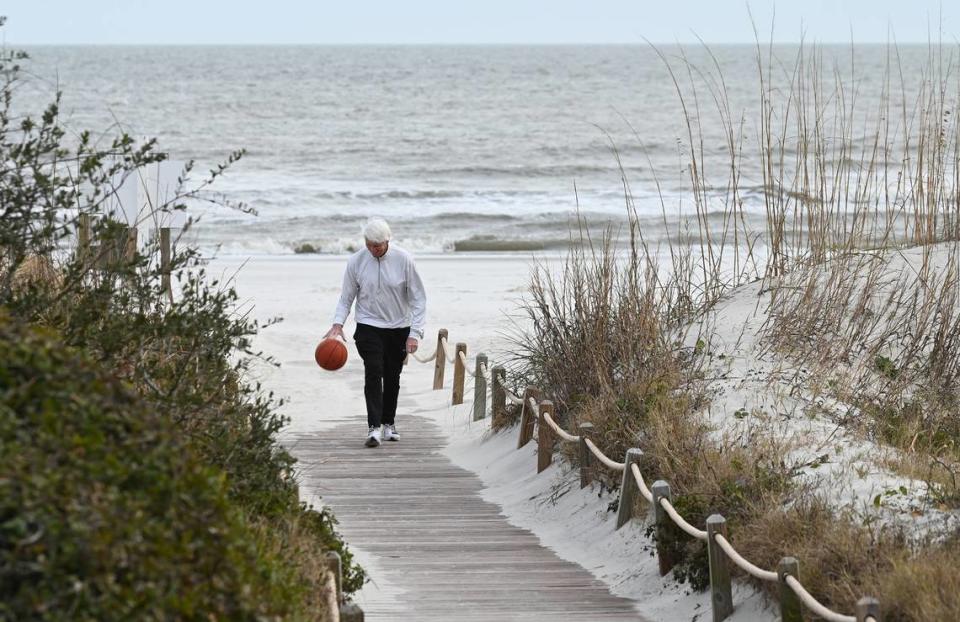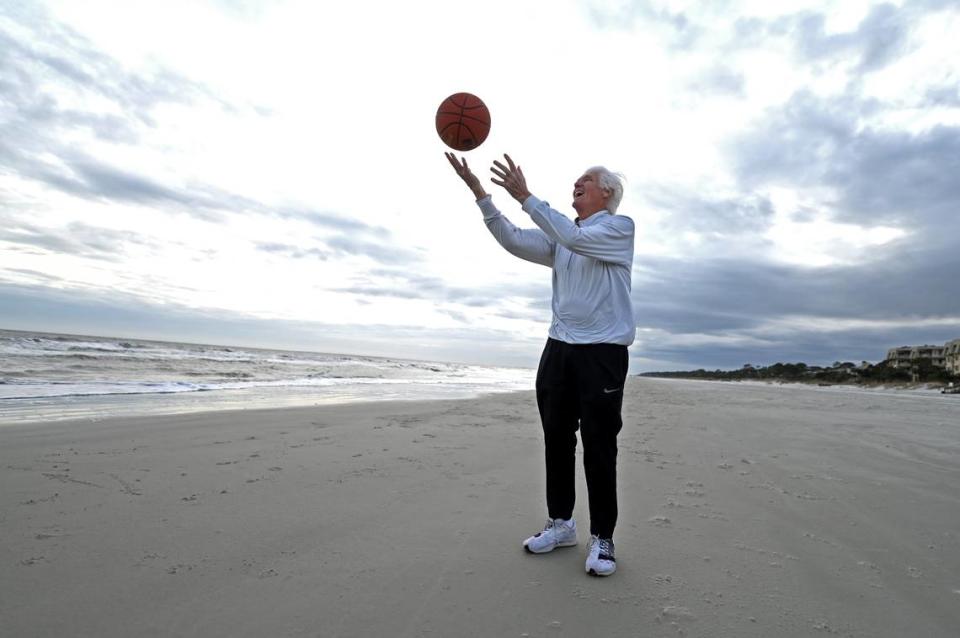March is sacred for basketball. Disagree? Former coach Bobby Cremins will fight you on it
The siren song of a bouncing basketball led Bobby Cremins all over the Carolinas.
Cremins crisscrossed both states during his hoops journey. He played basketball under Frank McGuire at the University of South Carolina in the late 1960s. He left for North Carolina to become the head coach at Appalachian State at age 27. At the end of his career, he would coach at the College of Charleston.
It was in between those two jobs where Cremins made his greatest mark nationally. Cremins coached Georgia Tech from 1981 to 2000 while earning multiple ACC championships, winning three ACC Coach of the Year honors and directing the Rambling Wreck all the way to the Final Four in 1990.
After 31 years as a college basketball head coach, Cremins now lives in Hilton Head, S.C., not far from the beach, with his wife, Carolyn. At age 76, he’s as charming as ever and surrounded by memorabilia from his career. His pickleball paddles are stowed by the front door. He remains a huge fan of the “March Madness” NCAA Tournament and claims he will fight anyone who ever tries to mess with basketball’s greatest month.
“If somebody threatens to take away March Madness, I’m going to go after them,” Cremins said during our interview, his voice rising. “I’m going to publicly speak out against that person. I don’t want to hear about it. March Madness is what makes our game. There’s nothing like it — to give the underdog an opportunity to compete with the big guys.”
Cremins’ “Sports Legends of the Carolinas” interview has been edited for clarity and brevity. For a fuller version, check out the “Sports Legends of the Carolinas” free podcast.
Scott Fowler: How and where did you grow up?
Bobby Cremins: I was a product of New York schoolyard basketball.
My parents were Irish immigrants. And they came across the Atlantic Ocean and landed in the Bronx, New York, with a lot of other immigrants and a lot of their family members.
I’d come out of our building every day and right across the street was this huge schoolyard that was part of an elementary school. In that schoolyard, we played games like stickball, softball, football, and there were two basketball goals. I gravitated to those basketball goals. And I fell in love with playing basketball. It all started for me right there. ... I was a street kid.

My parents were devout Catholics. My dad was a longshoreman, and then he became an elevator operator in an apartment building downtown. I had two brothers and a sister. My dad worked his tail off and I never saw him much during the week. My mother stayed home.
They wanted to come to America, raise a family and give their children an opportunity to live the American dream. It was that simple.
SF: When did you start getting noticed as a player?
BC: I went to a Catholic grammar school and made the team. Back in those days they gave scholarships at the Catholic high schools. A good example would be Lew Alcindor (later Kareem Abdul-Jabbar). He didn’t have to try out, but I did (at a high school called All Hallows). ... And next thing I know they called my house. And they told my mother that they were going to give me a full scholarship to go to All Hallows. She started crying.
SF: How’d you end up at South Carolina playing basketball?
BC: All Hallows was tough academically and I was a little bit over my head. I had some academic issues and actually had to repeat one grade. So when my senior year came, my eligibility was up. I then went to Frederick Military Academy in Portsmouth, Va., a prep school.
And it was really crazy. We had an afternoon game in Maryland, and South Carolina was playing the University of Maryland that Friday night. Coach Frank McGuire was in his hotel room. And there was a prospect at the school we were playing against, so Coach decided to go over there with a friend and watch a little bit of the game to kill time. So he saw me play by accident.
After the game, he came up to me, and one thing led to another.

SF: What was it like coming to South Carolina from The Bronx in the 1960s?
BC: God bless my mother. She knew I was traveling and she wanted me to stay warm. So she bought me a gray wool suit. And so, believe it or not, I arrived in Columbia, S.C., in late August, wearing a wool suit.
The assistant coach, Donnie Walsh, picked me up and said, “You can take your tie off.” The first place he took me was to Coach McGuire’s house, which was beautiful. The first thing I said was: “Hey, Frank, nice pad you have here!”
Donnie Walsh immediately grabbed me and said: “Don’t ever call Coach McGuire ‘Frank.’”
The wool suit never made it out of the closet again. But my mother would always say, “How’s that suit? Are you wearing it?” I’d say, “Oh yeah, Mom, it’s really keeping me warm.”
Nicknamed ‘Cakes’ at USC
SF: Was it a culture shock, from New York to South Carolina in the mid-1960s?
BC: Not a culture shock — a home run! I couldn’t get over how well I was treated. I couldn’t get over Coach McGuire and how great he was and how important basketball was. We had a fieldhouse and it was packed. I had no idea about anything about the South. But I loved everything about it.
Now I couldn’t talk real well. So they gave me a nickname: Cakes.

SF: What did “Cakes” mean?
BC: Well, everybody thought that I talked like I had cake in my mouth.
SF: In 1969-70, you had a great season with the Gamecocks, but then a difficult loss in the ACC final to N.C. State meant no NCAA Tournament for the team that had been the best in the ACC all year to that point. How hard was that?
BC: That was my first crisis. We were on top of the world. And then John Roche, our superstar, got hurt in the ACC semifinals. ... They shot him up in the locker room and God bless him, he came out and played anyway in the final (but was not 100 percent).
Long story short, the game (played in Charlotte) went into double overtime and we lost (42-39). It was just overwhelming and it got the best of me.
And I got my roommate Corky Carnevale and said, “We’re not going to Columbia. We’ve gotta get out of here.” And we met a friend and she took us to the North Carolina mountains and we stayed in the mountains for about a week. ... I went off the grid. I disappeared.
Coach McGuire was real nice about it the first time we talked to him. The second time he said he was gonna kill me if I didn’t get back there. So I eventually went back.

The ‘culture shock’ of Boone
SF: In 1975, you got the Appalachian State head coaching job at 27, after serving as an assistant under McGuire at South Carolina.
BC: Boone? Now that was a culture shock. Columbia was great. The weather in the South was great. But I didn’t know that Boone was the North Pole of the South. I mean, I froze.
It was beautiful in the spring and summer, but I couldn’t get a lot of North Carolina kids to go there. So I went to New York, got a scout to help me, and we just started picking out kids. And I brought back about five New Yorkers to Boone. And those kids, mostly those New Yorkers, won a Southern Conference championship for me. We built a program, started to get some kids from the South, and that put me on the map.
SF: Your hair is one of your trademarks. When did it start going white?
BC: Toward the end of my time at Appalachian (at age 33, in 1981), it started getting a little white.

And I never touched it . Hair wasn’t important to me. One time I did try to put some of that grease stuff on it to keep it back, and it didn’t work.
The ‘worst decision’ Duke ever made
SF: You wanted to get back into the ACC after your success at Appalachian State, right?
BC: Yes, I started getting a little ambitious. I still had something that bothered me; the loss to N.C. State in the 1970 ACC tournament. I figured I could get some redemption here by going back into the ACC as a coach and winning an ACC championship as a coach that I lost as a player.
And so two jobs opened up (in 1980) — Duke and N.C. State. So I called both schools.
At N.C. State, the athletic director, Willis Casey, was very nice. But he said: “We got a guy. And he actually is a New Yorker.”
I said, “Who’s that?”
He said, “Jimmy Valvano.”
And I said, “Well, he’s pretty good.”

Then I called Tom Butters at Duke. Yeah. And he said, “Yeah, Bobby, I’ve heard about you, but we got our coach.” And I said, “Who’d you get?”
He said, “We’re gonna get Mike Krzyzewski.”
I said, “The guy from Army with a losing record? Mr. Butters, that has to be the worst decision you ever made.” (Laughs.) So I missed out on those two jobs.
SF: And then you got the Georgia Tech job one year later, at a time where Georgia Tech was the worst team in the ACC.
BC: Yeah. Nobody really wanted the job. But when I looked at Georgia Tech all I saw was: ACC. ACC. ACC! A chance to get back at all those guys.

SF: You joined a legendary group of coaches.
BC: Absolutely. Coach Dean Smith (at UNC) was on top and he was in the league by himself. And everybody was after him. The second group was Coach Lefty Driesell (Maryland), Coach Terry Holland (Virginia) and Coach Carl Tacy (Wake Forest).
They didn’t like Coach Smith, or they didn’t like him being on top. And then there were the young guys. They called us the young guns. And that was Jimmy, Mike and myself. ... We all became close. I saw Jimmy V win a national championship (in 1983). That’s what happened first. Those two were doing unbelievable things, and I had to catch up a little bit.
In the coaches’ meetings, Jimmy would come in and just take over. He could bring people together with his storytelling. Dean Smith loved him. And Mike? He just took the whole thing to another level. He was a great defensive coach. ... I think I can speak for Jimmy and Mike and tell you that you know, Dean Smith set the bar. He showed us what it would take to be a champion. And all three of us won ACC tournaments.
Now Coach K — he broke the bar. But Dean Smith set the bar.

SF: Why were you able to turn Georgia Tech around?
BC: I was a bit crazy. I always say Jimmy Valvano — he’d go about 120 miles an hour. I’d go about 100 miles an hour. Coach K? He stayed at the speed limit. He was more balanced than we were. And I had a great staff…. We hit the recruiting road hard. George Felton found a point guard from Enid, Oklahoma. George said the point guard was 5-11 and white. I said, “You gotta be kidding.”
But he convinced me, and that was Mark Price. And then my New York roots helped us get John Salley. Price and Salley were the first ones, and then we got a lot of other great players (including Kenny Anderson, Stephon Marbury and Dennis Scott.) What made me was my players.
When Cremins took the USC job
SF: What’s the biggest regret of your career?
BC: I had my midlife crisis (in 1993) where I left Georgia Tech for two days to go back to South Carolina. That was rough. Really rough. I had said no to South Carolina. But I had a deep love for them.
After I said no to (USC athletic director) Mike McGee, a week went by, and then I changed my mind. I called Mike McGee and said, “I’ll come.”
We had lost in the first round (of the NCAA Tournament), and it was really one of the worst decisions of my life. It had nothing to do with my alma mater and had everything to do with me. And I knew it was not right. But I did it.

Of course, the people in South Carolina and Columbia, they went crazy, which I really appreciated. But once I got there, I realized I made a mistake.
I felt like Judas. I was just in a bad place. ... Obviously a lot of people were upset at me, and rightfully so. (Cremins quickly reversed course and went back to Georgia Tech).
It was the roughest time in my life. I took a month off. I had to go see a shrink. Went down to Florida. Got away. Had to get on medication. A lot of people thought I was done. I knew I was not done. I just needed time. And what really helped me the first part of recovery was seeing South Carolina get such a great coach by the name of Eddie Fogler. That was the start of my recovery.
‘Pulling a Cremins’
SF: You left Georgia Tech in 2000, took time off, got into broadcasting and then eventually returned to coaching in 2006, taking over at College of Charleston for your final six seasons.
BC: I came down to Hilton Head then, with just the intention of one or two years. But one year led to six. And then College of Charleston let go of their coach late. And Gregg Marshall, the head coach of Winthrop at the time, took the job. Then my old college roommate Corky Carnevale calls me and says, “Marshall pulled a Bobby Cremins. He just went back to Winthrop.”
And then I turned on ESPN and they said it just like that: “Gregg Marshall has pulled a Bobby Cremins and left College of Charleston.”
So it’s ironic, but it took another coach doing a flip-flop to get me back into coaching.
The Charleston job was great. I loved it. I got a little sick at the end of my career. My body turned on me. Those tough losses — they eat at you. We lost in the (tournament final) three times, once to Bobby McKillop and a kid by the name of Steph Curry.
So eventually I came back to Hilton Head. And I’ve had a great life. People ask me about wins, losses, awards, halls of fame: I don’t care.
I mean all that stuff is nice. But I feel like my biggest achievement is fulfilling my parents’ dream, of having their child live the American dream.
For a fuller version of this interview in podcast form, go to “Sports Legends of the Carolinas,” wherever you find your podcasts, and search for the Bobby Cremins episode.
Previous “Sports Legends” interviews with guests including Richard Petty, Steph Curry, Roy Williams, Mike Krzyzewski, Jake Delhomme, Bobby Richardson, Thomas Davis and Dawn Staley are also available on the podcast. New “Sports Legends” episodes debut every 2-3 weeks throughout 2024. The “Sports Legends” coffee-table book came out in late 2023 and is now available at SportsLegendsBook.com.



